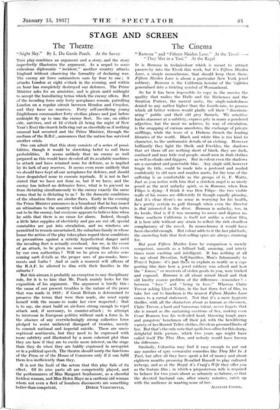The Cinema
" Ramona " and "Fifteen Maiden Lane." At the Tivoli-- "They Met in a Taxi." At the Regal IT is Ramona in technicolour which is meant to attract passers-by into the Tivoli this week, but it's Fifteen Maiden
Lane, a simple monochrome, that should keep them there. Fifteen Maiden Lane is about a particular New York jewel robbery. Ramona is the California heroine of the 'eighties generalised into a tinkling symbol of Womanhood.
So far it has been impossible to copy in the movies the quality that makes the Hulls and the Hichenses and the Stratton Porters, the mental unity, the single-mindedness denied to any author higher than the fourth-rate, to possess which all better writers would gladly sell their " discrimin- ating " public and their old grey flannels. We sensitive hacks stammer at a subtlety, express pity in many a pondered adjective, but the most we achieve, by way of circulation, is the swapping of curious anecdotes, the exchange of private snifflings, while the tears of a }lichens drench the lending libraries of the world. Black and white film is too kind to character, to the undramatic details of an etching. However brilliantly they light the Sheik and Freckles, the shadows that set them off are nothing short of black, they are dark, confused and may hide real people, small men in drab clothes as well as cloaks and daggers. But in colour even the shadows are a succulent and penetrable blue. Any single still, however
tragic its title, could be made into a postcard and mailed confidently to old men and maiden aunts, for the tone of the
suffering is as comfortable as the groups of G. F. Watts.
Just as you notice with him that a stricken angel is as nicely posed as the next unlucky spirit, so in Ramona, when Don Filipo is dying—I think it was Don Filipo—the two visible walls of his rooms are differently lit though equally pleasing. And it's clear there's no sense in worrying for his health, he's pretty certain to pull through when even the director
is that interested in the decor. Ramona is unlucky, too, in its locale, that is if it was meaning to move and depress us.
Since southern California is itself not unlike a colour film, it is here able without any strain to reflect the rich cloudless complacency of the novel. In monochrome it would have been cheerful enough. But colour adds to it the last platitude, the encircling halo that best-selling epics arc always straining for.
But poor Fifteen Maiden Lane by comparison is merely competent, smooth as a billiard ball, amusing, and ninety times more exciting and intelligent. It has nothing at all to say about Devotion, Sell-Sacrifice, Man's Inhumanity to Honest Injuns—it's just there to explain as neatly as a sup- porting film dare how a jewel robbery was solved and how the " fences," or receivers of stolen goods to you, were tricked and exposed. Ramona is all about mixed blood and that old knotty cosmic problem of the difference—remember ?- between " love " and " being in love." Whereas Claire Trevor asking Lloyd Nolan, in the last three feet of film, to take her out to luncheon is the nearest Fifteen Maiden Lane comes to a carnal statement. Not that it's a mere hygienic thriller, with all the characters about as human as chessmen. Claire Trevor, a hard and humorous talent, never forgets that she is meant as the sustaining overtone of Sex, making even Cesar Romero lose his well-oiled head, throwing tough guys and gangsters' henchmen off their job with the bewildering variety of her Bonwit Teller clothes, the clean groomed limbs of her. But that's the only note that spells box-office for this sharp, delightful little picture, which two years ago might have called itself The Thin Man, and nobody would have known the difference.
Similarly, Columbia may find it. easy enough to put out any number of spry vernacular comedies like They Met In A Taxi, but after all they have spent a lot of money and about eighteen months grooming Rosalind Russell to play cultured icebergs, and so at the Regal it's Craig's Wife they offer you as the feature film ; in which a preposterous wife is required to behave for two years about as urbanely as Salome, so that the devoted husband can, after ninety minutes, catch up with the audience in wanting none of her.
ALISTAIR COOKE.










































 Previous page
Previous page